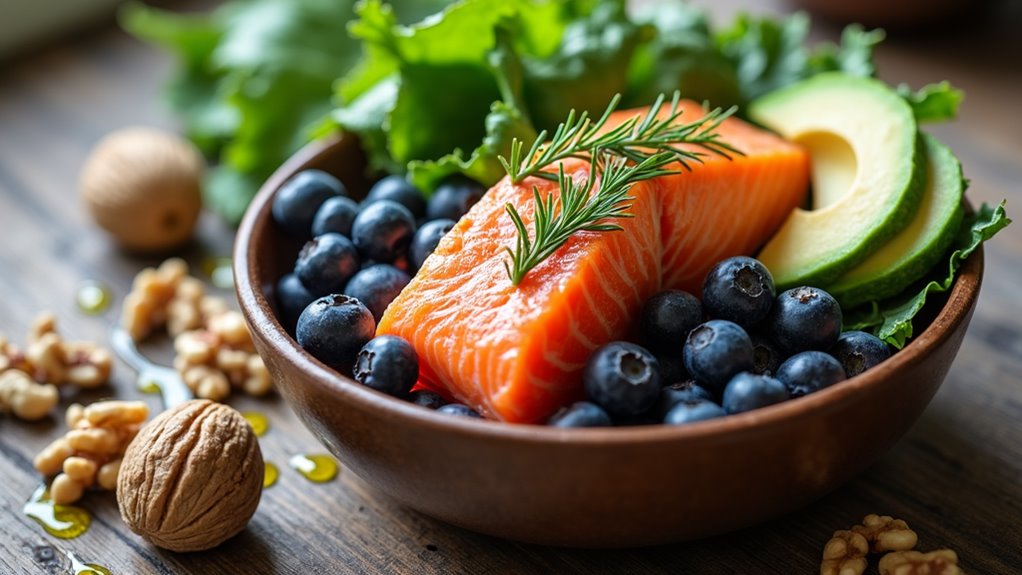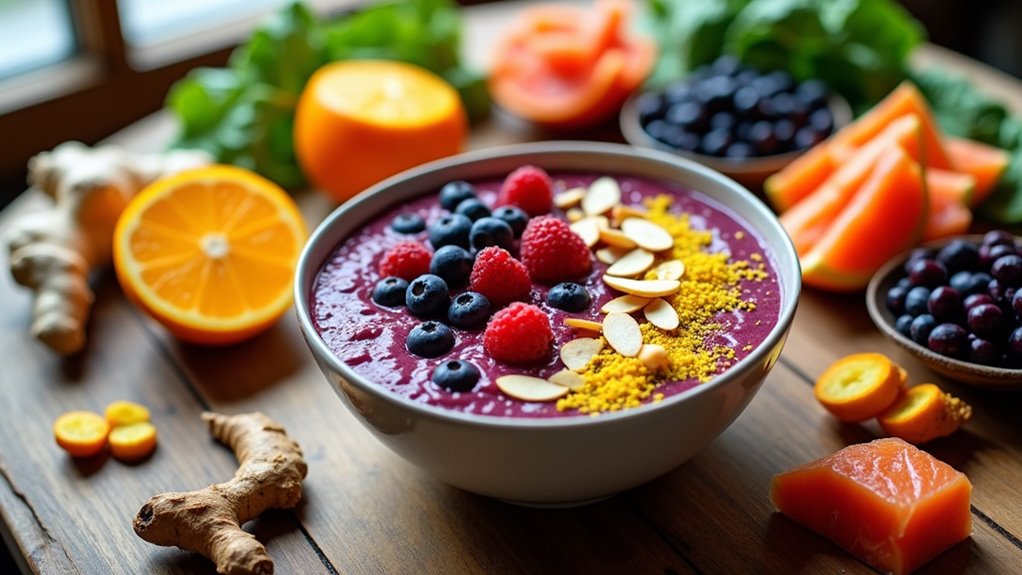Your daily food choices can act as powerful medicine for your body and mind. By incorporating immune-boosting foods like citrus fruits, garlic, and turmeric, you'll strengthen your natural defenses. Anti-inflammatory options such as fatty fish, berries, and leafy greens help combat chronic health issues, while fermented foods support optimal gut health. Heart-protective choices like olive oil, nuts, and whole grains enhance cardiovascular function, and brain-boosting nutrients from blueberries and omega-3-rich foods sharpen cognitive performance. Understanding these nutritional strategies will unlock your body's incredible potential for self-healing and vibrant wellness.
Key Takeaways
- Garlic, ginger, and turmeric contain natural compounds that fight infections and reduce inflammation in the body naturally.
- Fermented foods like yogurt and kimchi strengthen gut health by providing beneficial probiotics and improving nutrient absorption.
- Omega-3 rich foods such as salmon and walnuts support brain function while reducing inflammation throughout the body.
- The Mediterranean diet promotes heart health through its emphasis on vegetables, whole grains, and healthy fats.
- Citrus fruits, berries, and leafy greens provide essential vitamins and antioxidants that boost immune system function.
Understanding Food's Healing Properties

While our ancestors understood food as medicine through centuries of observation, modern science now confirms the powerful healing properties found in everyday ingredients.
You'll discover that certain foods can reduce inflammation, boost immune function, and even help prevent chronic diseases.
When you're looking to harness food's healing potential, focus on compounds like antioxidants in berries, omega-3 fatty acids in fish, and anti-inflammatory curcumin in turmeric.
These bioactive components work at the cellular level to protect your body and promote optimal health.
You can transform your kitchen into a natural pharmacy by choosing ingredients strategically.
Whether you're fighting a cold with garlic and ginger or managing blood sugar with cinnamon, you're tapping into nature's time-tested remedies backed by scientific research.
Inflammation-Fighting Foods
Although chronic inflammation can lead to various health problems, you can fight it effectively through your daily food choices.
You'll find powerful anti-inflammatory compounds in foods rich in omega-3 fatty acids, such as salmon, sardines, and walnuts. Colorful berries, particularly blueberries and strawberries, contain antioxidants that help reduce inflammation throughout your body.
Green leafy vegetables like spinach and kale provide essential nutrients that combat inflammatory responses, while turmeric and ginger offer natural anti-inflammatory properties you can easily add to meals.
Other beneficial choices include extra virgin olive oil, which contains heart-healthy polyphenols, and green tea, packed with inflammation-fighting catechins.
Gut Health Champions

You'll find amazing support for your digestive system in fermented foods like yogurt, kimchi, and kombucha, which contain beneficial probiotics that strengthen your gut microbiome.
Your body's digestive health also depends on consuming adequate fiber through whole grains, legumes, fruits, and vegetables.
When you combine probiotic-rich fermented foods with high-fiber choices, you're creating an ideal environment for beneficial gut bacteria to thrive.
Fermented Foods Benefits
Since ancient civilizations discovered food fermentation, these probiotic powerhouses have become essential for optimal gut health.
You'll find beneficial bacteria in foods like kimchi, sauerkraut, kombucha, and kefir, which can enhance your digestive system's function and boost your immune response.
Regular consumption of fermented foods can reduce inflammation, improve nutrient absorption, and help maintain a balanced gut microbiome.
They're particularly effective at breaking down hard-to-digest compounds and creating beneficial enzymes that your body needs.
You'll also benefit from their ability to produce vitamin K2, B vitamins, and other essential nutrients through the fermentation process.
If you're new to fermented foods, start with small portions and gradually increase your intake to allow your digestive system to adjust comfortably.
Fiber-Rich Diet Essentials
While many nutrients play vital roles in our health, dietary fiber stands as a cornerstone of digestive wellness and overall vitality.
You'll find two main types of fiber: soluble, which dissolves in water and helps control blood sugar and cholesterol, and insoluble, which adds bulk to stool and promotes regular bowel movements.
To reach your daily fiber goals, incorporate whole grains like quinoa and oats, legumes such as lentils and chickpeas, and a variety of fresh fruits and vegetables.
Start your day with a fiber-rich breakfast of steel-cut oats topped with berries, add a handful of nuts as snacks, and include at least two vegetables with each main meal.
Remember to increase your water intake as you boost your fiber consumption to help prevent digestive discomfort.
Heart-Protective Dietary Choices
You'll find remarkable heart protection by following a Mediterranean diet rich in vegetables, fruits, whole grains, and fish.
Your heart will benefit from choosing healthy fats like olive oil, nuts, and avocados, which can help reduce inflammation and improve cholesterol levels.
These dietary choices work together to strengthen your cardiovascular system and lower your risk of heart disease.
Mediterranean Diet Benefits
Because research consistently demonstrates its cardiovascular benefits, the Mediterranean diet stands as one of the most heart-protective eating patterns available. You'll find this diet rich in olive oil, fresh vegetables, whole grains, fish, and legumes, while it limits red meat and processed foods.
It's not just about individual foods – it's a lifestyle approach to eating.
Following this diet can help you lower blood pressure, reduce inflammation, and maintain healthy cholesterol levels. You'll also benefit from the diet's high antioxidant content, which helps fight cellular damage.
The Mediterranean diet's emphasis on social dining and mindful eating creates a sustainable approach to healthy living. By incorporating these eating patterns, you're choosing a scientifically-proven way to protect your heart and enhance overall well-being.
Best Heart-Healthy Fats
Since healthy fats play a crucial role in heart health, choosing the right types can significantly impact your cardiovascular well-being.
You'll find excellent sources of heart-healthy fats in extra virgin olive oil, avocados, nuts, and fatty fish like salmon. These foods contain monounsaturated and polyunsaturated fats that help reduce harmful cholesterol levels.
To protect your heart, you should replace saturated fats with these healthier options. Add a tablespoon of olive oil to your salads, snack on a handful of walnuts, or enjoy fatty fish twice a week.
You'll also benefit from including chia seeds and flaxseeds in your diet, as they're rich in omega-3 fatty acids.
Remember to limit processed foods and tropical oils, which often contain unhealthy trans fats that can damage your heart.
Brain-Boosting Nutrients

While your brain accounts for only 2% of your body weight, it consumes 20% of your daily energy and requires specific nutrients to function optimally.
You'll want to focus on omega-3 fatty acids, found in fatty fish like salmon and sardines, which support memory and cognitive function. B vitamins, especially B12 and folate, help maintain healthy brain cells and can be found in leafy greens and lean meats.
Don't forget antioxidant-rich foods like blueberries, dark chocolate, and walnuts, which protect your brain cells from oxidative stress.
Your brain also needs adequate protein to produce neurotransmitters – aim for sources like eggs, legumes, and quinoa. Including these nutrients in your daily diet can help maintain mental clarity, improve focus, and support long-term brain health.
Blood Sugar Balancing Foods
To maintain steady energy levels throughout the day, you'll need foods that help regulate blood sugar and prevent sudden spikes or crashes.
Focus on high-fiber foods like beans, lentils, and whole grains, which slow down digestion and glucose absorption. Add lean proteins such as fish, chicken, and eggs to your meals to help stabilize blood sugar levels.
Include healthy fats from avocados, nuts, and olive oil, which can reduce the glycemic impact of your meals. You'll also benefit from non-starchy vegetables like leafy greens, broccoli, and peppers, which provide essential nutrients without causing significant blood sugar fluctuations.
Remember to pair carbohydrates with protein or fat to create balanced meals that won't trigger sharp insulin responses.
Immune System Strengthening Foods

Five key foods can significantly boost your immune system's effectiveness. Citrus fruits provide vitamin C that helps produce white blood cells, while garlic contains allicin compounds that fight infections.
You'll find zinc in pumpkin seeds, which supports immune cell development and healing. Greek yogurt delivers probiotics that strengthen your gut's immune response, and turmeric's active compound curcumin reduces inflammation while enhancing antibody responses.
To maximize these benefits, you'll want to consume these foods regularly. Add orange segments to your breakfast, crush fresh garlic into your cooking, sprinkle pumpkin seeds on salads, enjoy plain Greek yogurt as a snack, and incorporate turmeric into soups and smoothies.
These simple additions can help protect you from seasonal illnesses and support overall immune function.
Practical Meal Planning Tips
Successful meal planning starts with setting aside dedicated time each weekend to outline your upcoming week's meals.
Create a simple template that includes breakfast, lunch, dinner, and snacks, then fill it with nutritious options that align with your health goals.
You'll want to inventory your pantry and fridge first, making note of what you already have.
Next, browse seasonal produce and weekly store specials to build cost-effective meal ideas.
When planning, aim for a mix of protein sources, whole grains, and colorful vegetables at each main meal.
Prep ingredients in bulk whenever possible – wash and chop vegetables, cook grains, or prepare protein portions in advance.
Store everything in clear containers, making it easy to assemble balanced meals throughout the week.
Frequently Asked Questions
How Long Does It Take to See Health Benefits From Dietary Changes?
You'll notice some health benefits from dietary changes within days, like improved digestion and energy levels.
Other changes take weeks to manifest – you might see better skin and sleep quality within 2-4 weeks.
More significant improvements, like reduced inflammation and balanced blood sugar, typically appear after 2-3 months.
Long-term benefits, including heart health and weight management, develop over 6-12 months of consistent healthy eating.
Can Food-As-Medicine Replace Traditional Medications Prescribed by Doctors?
You shouldn't replace prescribed medications with dietary changes without consulting your doctor.
While food can be powerful in supporting health and preventing disease, it's not a substitute for necessary medical treatments.
You'll get the best results when you combine proper nutrition with your prescribed medications.
Some conditions absolutely require medication, and stopping them could be dangerous to your health.
Are Organic Foods Necessary for Achieving Therapeutic Nutrition Benefits?
You might be surprised to learn that organic and non-organic foods can provide similar therapeutic benefits.
While organic foods typically have fewer pesticides, you don't need to buy everything organic to improve your health. What matters most is choosing nutrient-dense whole foods, regardless of their organic status.
Focus on variety, freshness, and quality – you'll get excellent nutrition benefits from conventional produce that's properly washed and thoughtfully selected.
What Role Does Cooking Method Play in Food's Medicinal Properties?
Your cooking method significantly impacts the therapeutic value of food.
When you steam or lightly sauté vegetables, you'll preserve more nutrients than boiling them.
Raw foods retain enzymes, while fermentation creates beneficial probiotics.
Gentle cooking can make some nutrients more bioavailable, like lycopene in tomatoes.
You'll want to avoid high-heat methods like deep frying, which can create harmful compounds and destroy vital nutrients.
Should I Consult a Healthcare Provider Before Starting a Therapeutic Diet?
Studies show that 70% of chronic diseases are influenced by diet.
You should absolutely consult a healthcare provider before starting any therapeutic diet. They'll assess your medical history, current medications, and specific health needs to ensure the diet won't harm you.
Your doctor can also monitor your progress, adjust recommendations based on your body's response, and help prevent potential nutrient deficiencies or complications.
Conclusion
Like a master artist selecting the perfect colors for a masterpiece, you'll paint your plate with nature's medicine. You're not just eating – you're building a fortress of health with every mindful choice. Whether you're taming inflammation, nurturing your gut, or feeding your brain, let food be your daily dose of wellness. Your kitchen can become your personal pharmacy, dishing out healing one meal at a time.

Leave a Reply